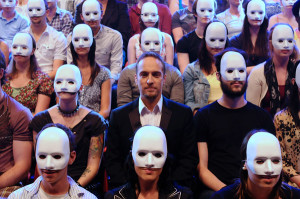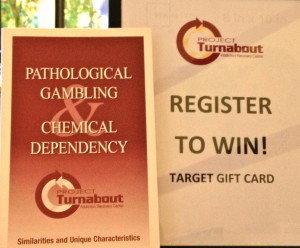Anonymous, Not Invisible Anymore
 Anonymous, not Invisible….What does that imply? To most people, it may mean nothing other than as a reference to a single person lost in a crowd, visible to others, but not known to them. For those individuals who are of an addictive sort, it may be a reference of people belonging to one of the “A” groups ending in Anonymous, such as Alcoholics Anonymous, Gamblers Anonymous, Overeaters Anonymous and so forth. No, the statement ‘Anonymous, not Invisible’ instead is directed towards that small percentage of people who are compulsive gamblers that are surrounded by those who would be insensitive to someone with this problem. It is not intentional nor blatant abuse, but is evident and present throughout our society. Illustrated below are some examples and in some cases it evolves from a lack of understanding of what it means to be a compulsive gambler in recovery:
Anonymous, not Invisible….What does that imply? To most people, it may mean nothing other than as a reference to a single person lost in a crowd, visible to others, but not known to them. For those individuals who are of an addictive sort, it may be a reference of people belonging to one of the “A” groups ending in Anonymous, such as Alcoholics Anonymous, Gamblers Anonymous, Overeaters Anonymous and so forth. No, the statement ‘Anonymous, not Invisible’ instead is directed towards that small percentage of people who are compulsive gamblers that are surrounded by those who would be insensitive to someone with this problem. It is not intentional nor blatant abuse, but is evident and present throughout our society. Illustrated below are some examples and in some cases it evolves from a lack of understanding of what it means to be a compulsive gambler in recovery:
- Football season has arrived and with it comes the friendly betting of the outcomes of the games, as well as the traditional office pool for Monday Night football….”Pay only $2 a square and you could win $xx per quarter if you have the right square (all done randomly)
- At an ice-breaker of a church group, they offer a version of ‘human bingo’ to meet a lot of people in a short time by mingling and talking to the people they cross off their squares when they’ve matched up some of the various types of people (i.e. ex-military, current military, homemaker, home town) and form a bingo pattern on their sheet and win a prize. ( It also happens to be a large church that prides itself on their successful ‘Celebrate Recovery’ program.)
- In conversations with people, the expression of ‘you bet’ or ‘I bet’ thrown casually into the mix could be a common expression that one hears throughout the Midwest especially, but to a compulsive gambler could be a challenge or annoyance.
- Large retailers and even restaurants that offer the consumer a chance to win $500 or more in gift cards if they go online and fill out the customer survey. Seems innocent enough and easy way to win a prize without spending any money…It’s not really gambling, is it? (Yes, for a compulsive gambler it is the crack in the foundation of a solid recovery program.)
- A co-worker or family member in an argument with a compulsive gambler and wants to settle it with a friendly and even, innocent wager that may not involve money but to a compulsive gambler a ‘small bet is like a drink to an alcoholic’.
These examples illustrate just a few of the daily, yet common challenges to the recovery of a compulsive gambler for several reasons. In some cases, there is great shame and a stigma to being a compulsive gambler and they choose to not draw attention to their (past or current) problem with gambling and remain silent when put into these situations. It could be that they cannot share their secret because it could jeopardize their relationship or job security. It could be that they are a member of a 12-step group that emphasizes and recommends that one should always maintain anonymity (‘the spiritual foundation’ of the program, as well as encouraged to ‘maintain personal anonymity at the level of press, radio, films, television, and the Internet’). So, taking all of that into account, it is possible to begin to understand how frustrating it can be to remain anonymous and not give voice to the insensitivity that runs rampant in our society towards compulsive gamblers in recovery; hence, they are invisible.
In recent years there have been several movements to encourage these ‘anonymous’ members to speak up and remove the secrecy and shame, to let their voices be heard. One such movement called ‘Faces and Voices of Recovery’ encourages addicts of all addictions to share their stories of hope and recovery on their website, as well as encouraging those that can speak up without fear of retaliation from their employer or family to do so and do it with pride. Another such movement found brilliantly depicted in a documentary by Greg Williams and soon to be released in movie theaters is called “Anonymous People” and although it focused on those with drug/alcohol addictions, it could easily describe those that are compulsive gamblers. In the movie, founders of the McShin Foundation talk about how there are 23 million addicts (not including compulsive gamblers) and what a difference it could mean for more funding and treatment programs if these ‘anonymous and silent’ people would speak up and let their voices and votes be counted.
Gambling venues and opportunities are everywhere now….found in many countries, in social media outlets such as Facebook, online gambling, the neighborhood bar, workplace raffles, church bingo, and so much more. Is it simply that the compulsive gambler needs to just develop a ‘thick skin, not be so sensitive when confronted by those that are unaware and just get over it’? That would be the easy answer, but what to do when confronted with an ‘in your face affront to your addiction’ by those that are professionally aware, yet still ignorant? Case in point: At a recent film festival held at the University of Nevada in Las Vegas (UNLV) called ‘Reel Recovery’ that presented some excellent films depicting alcohol, drug, and gambling addictions, one of the folks that was traveling with this show was encouraging the attendees to stick around for the movie at 7pm. A person spoke up and said “What about the film at 4pm called ‘Owning Mahowney’ (an excellent movie based on a true story depicting a Canadian banker’s progressive and downward spiral of his gambling)?” This individual then remarked “Oh right, but before we show that movie folks, we’re going to have a raffle.” Really???? How different would that be if he had said “Oh, and before we show the movie “Flight’, we’ll be providing some coke and alcohol before we view the movie.” Yet, another fine example of the insensitivity that prevails from someone that is working with addicts and definitely should know better, right? Another example is illustrated in the picture below:
 Perfectly innocent sign found on a table at a recent convention held in Washington. It was a booth for a treatment facility treating chemical dependencies and pathological gambling. What makes this so ‘not right on so many levels’ is that the convention was for the National Councils for Problem Gambling! The placard ‘Register to Win’ was an incentive to encourage folks to stop by the booth and put their business cards into a bowl to win a Target gift card. (At any other type of convention, this would be a normal happening and no one would be offended or think twice about it.) Although in fairness to the treatment center and convention hosts, there were many attendees that were clinicians and professionals that run the various councils and just a small percentage of attendees that are in recovery from problem gambling.
Perfectly innocent sign found on a table at a recent convention held in Washington. It was a booth for a treatment facility treating chemical dependencies and pathological gambling. What makes this so ‘not right on so many levels’ is that the convention was for the National Councils for Problem Gambling! The placard ‘Register to Win’ was an incentive to encourage folks to stop by the booth and put their business cards into a bowl to win a Target gift card. (At any other type of convention, this would be a normal happening and no one would be offended or think twice about it.) Although in fairness to the treatment center and convention hosts, there were many attendees that were clinicians and professionals that run the various councils and just a small percentage of attendees that are in recovery from problem gambling.
So, bottom line, what’s a recovering compulsive gambler to do when faced with these insensitivities? Ignore the challenge to settle an argument with a friendly wager? Confront the individual with indignation and hostility? Hold on to a resentment that ‘they’ just don’t get it and never will? Speak up with conviction and state that you are ‘an addict in long-term recovery’ and be proud of your achievement, as well as letting your voice be heard.
We may still be anonymous, but we don’t have to remain invisible anymore. Anonymity as it refers to in those 12-step programs is about protecting and preserving others’ anonymity who are in those rooms, but does NOT and should NOT preclude one from speaking about their own recovery and providing hope, strength, and their experiences to help others.

